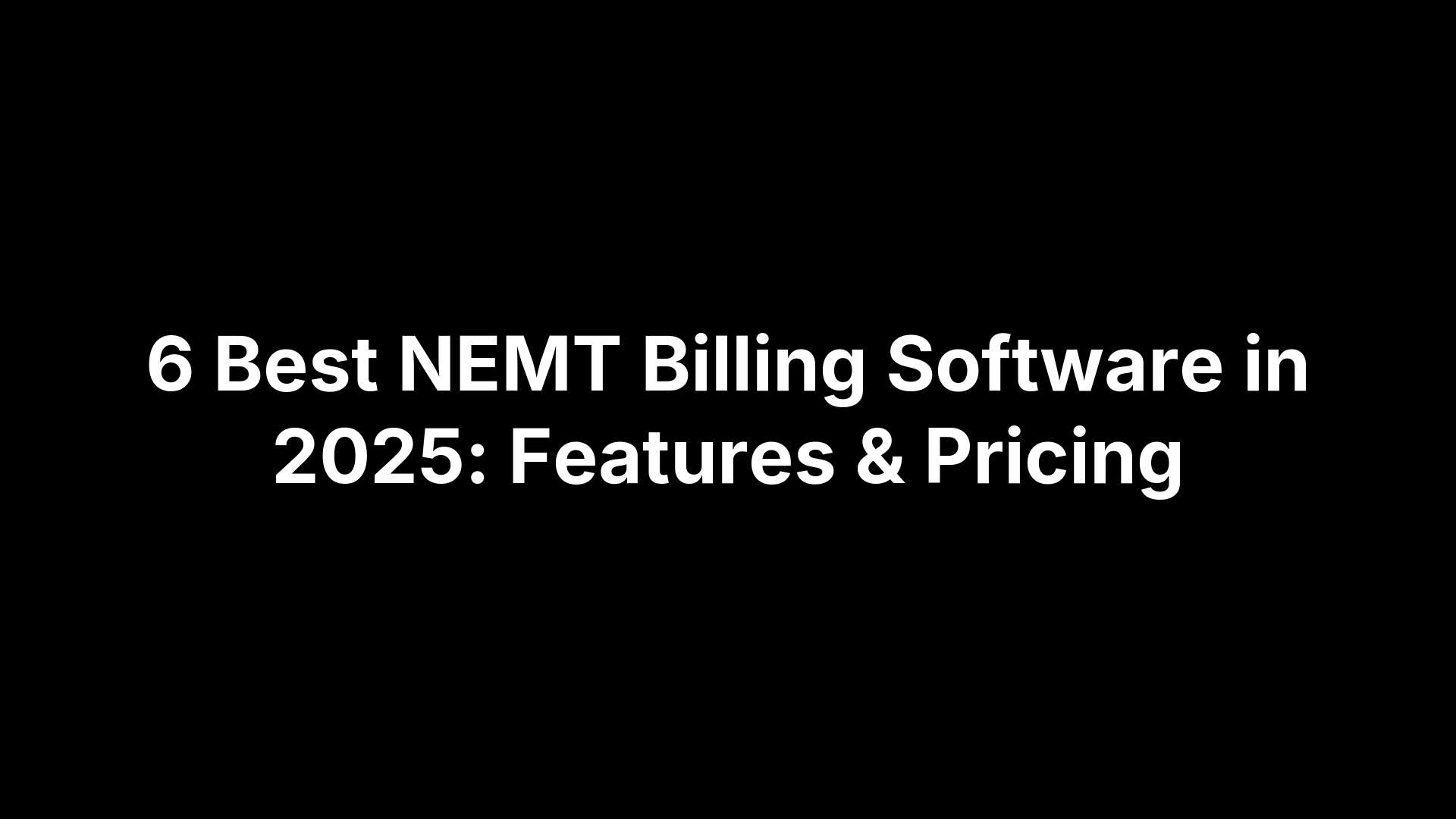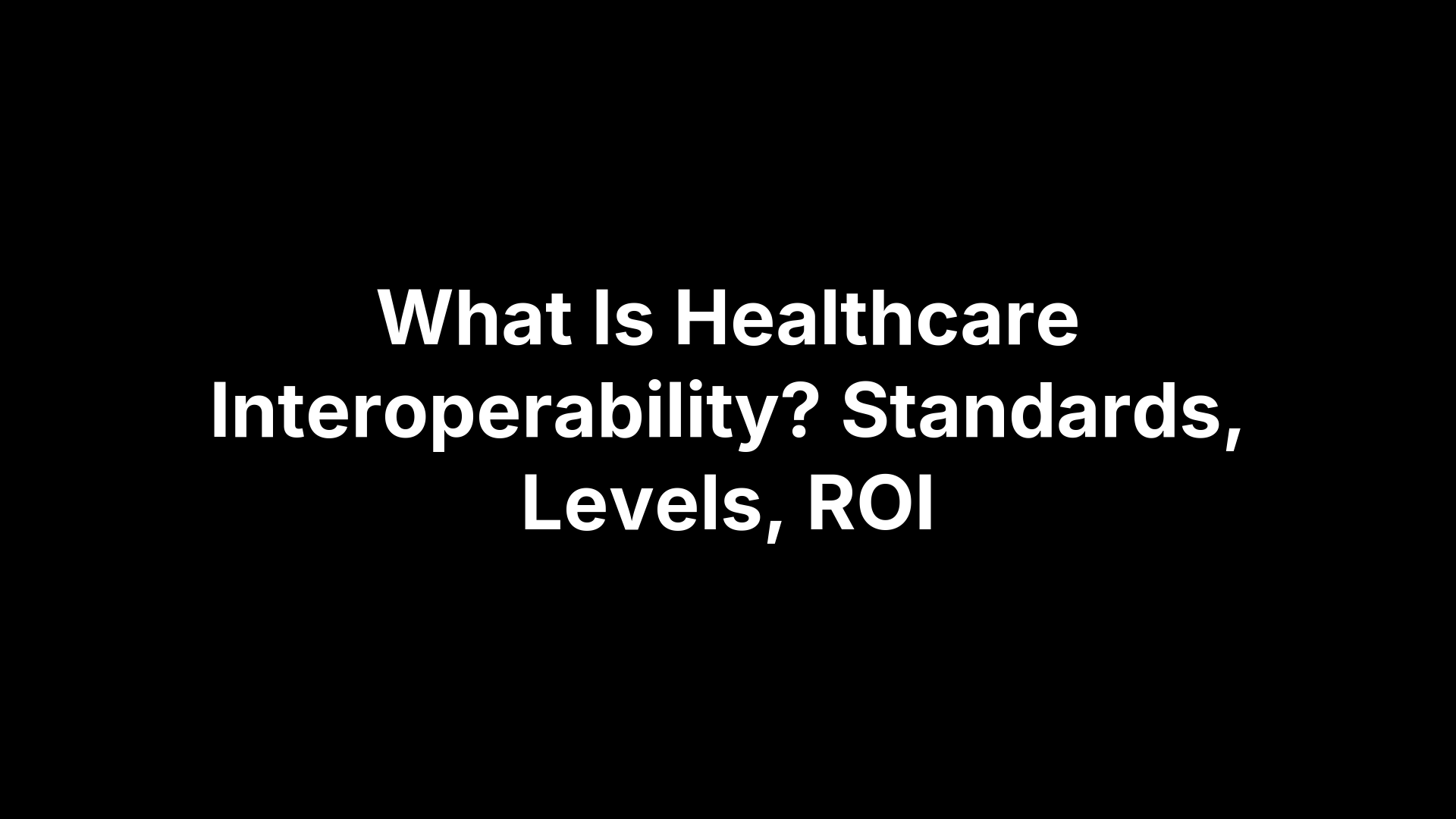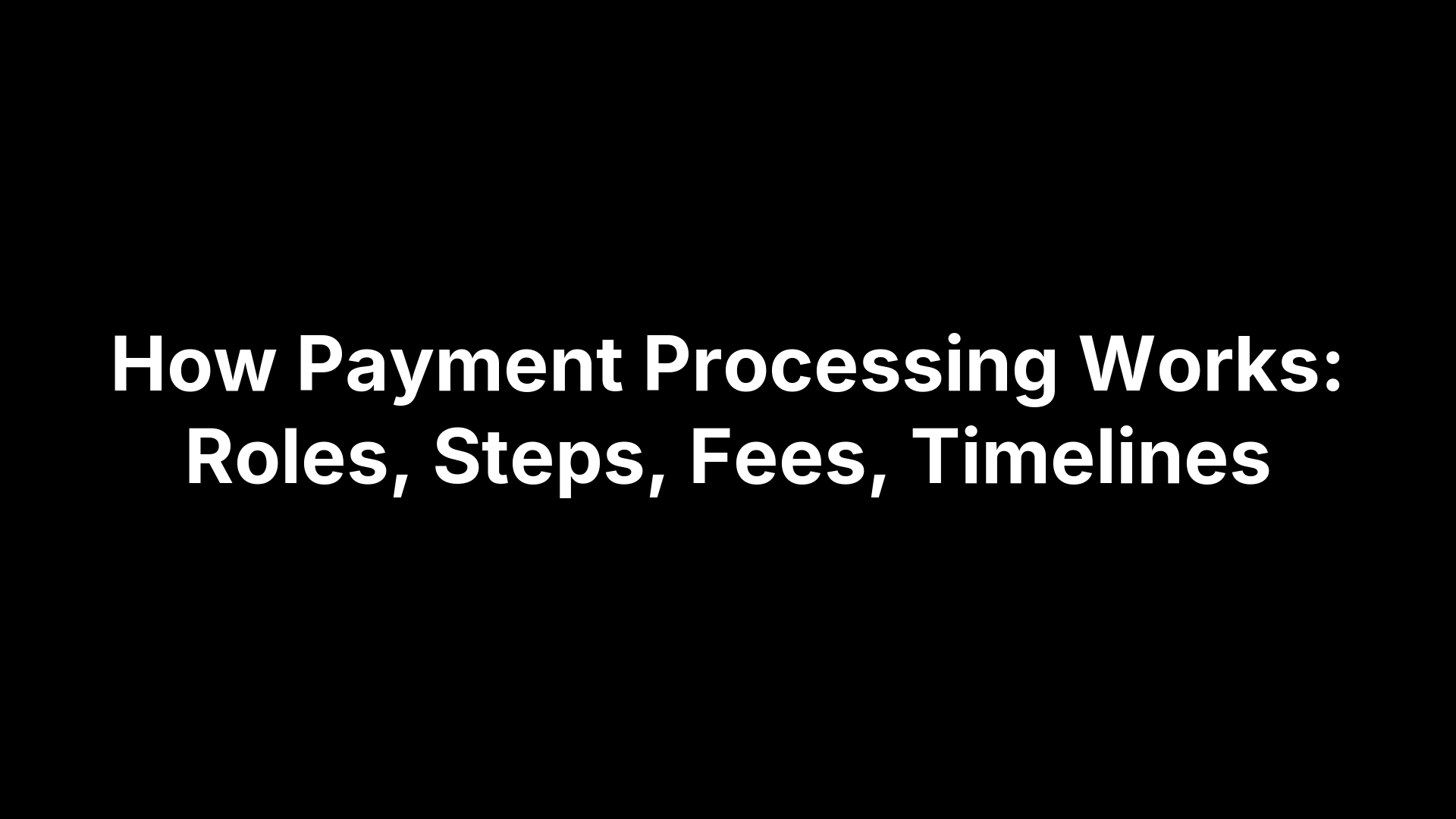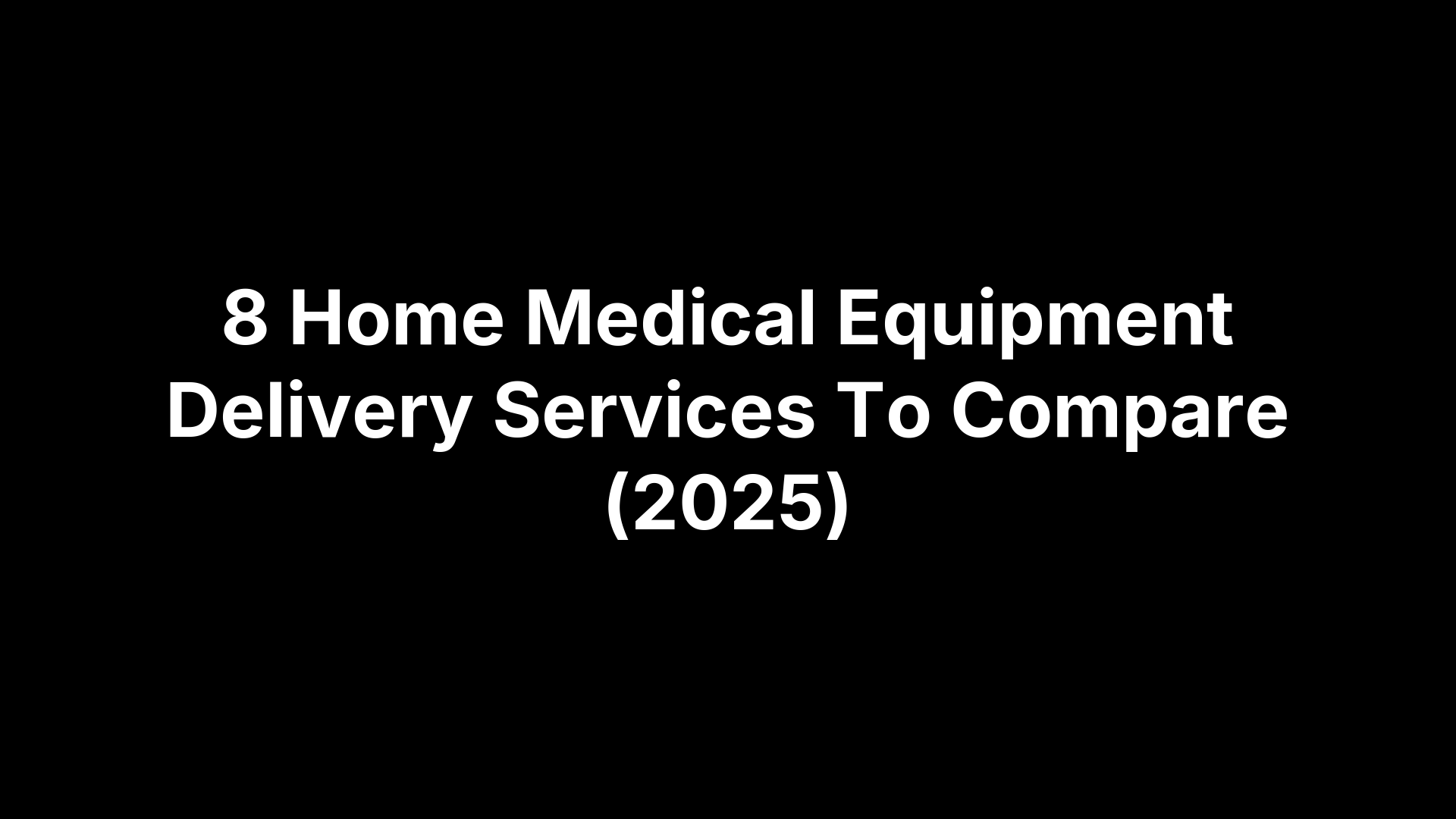6 Best NEMT Billing Software in 2025: Features & Pricing


6 Best NEMT Billing Software in 2025: Features & Pricing
If your team is spending more time chasing denials than completing trips, it’s usually a billing problem—not a demand problem. NEMT billing is uniquely complex: state-by-state Medicaid rules, broker-specific trip attestations, EVV requirements, mileage vs. loaded miles, modifiers, and paper trails that must line up with 837P/837I files and 835 remits. Add manual reconciliations, clearinghouse rejections, and inconsistent data from drivers, and days in A/R climb while cash flow stalls.
This guide cuts through the noise. We reviewed six leading NEMT billing platforms to help you pick a system that automates clean claims and shortens reimbursement cycles. For each option—VectorCare, RouteGenie, Tobi Cloud, TripMaster, MediRoutes, and NEMT Cloud Dispatch—you’ll see: core billing features (claims, invoicing, ERA posting, trip-to-invoice reconciliation), integrations and compliance (brokers like Modivcare/MTM/MAS, EHRs, clearinghouses, EVV, HIPAA), and pricing with ideal use cases (per-vehicle, per-user, or custom). Whether you’re a small operator needing faster Medicaid payments or a multi-fleet provider standardizing billing across brokers and payers, you’ll leave with a clear short list—and the confidence to choose the right fit next.
1. VectorCare
VectorCare brings billing, dispatch, and care coordination into one unified patient logistics platform—so NEMT billing doesn’t live in a silo. Its Pay, Insights, and ADI (Automated Dispatching Intelligence) modules work together to move clean, documented trips from scheduling to invoicing and payment collection with fewer handoffs and less rework.
Core billing features
VectorCare focuses on turning accurate trip data into fast, predictable cash. Pay centralizes invoicing and payments (including ACH and credit cards), while ADI automates repetitive dispatch and billing steps—like price negotiation and applying protocols—so teams spend less time keying data and fixing errors.
- Custom invoicing: Build and send tailored invoices with automated notifications and reminders.
- Payment options: Collect via ACH and credit card to accelerate time-to-cash.
- Automated workflows: ADI agents handle scheduling-to-billing tasks and price negotiation to reduce manual touchpoints.
- Documentation-first billing: Hub workflows (e.g., protocols, PCS signatures, secure messaging) help ensure trips are fully documented before billing.
- Revenue intelligence: Insights dashboards surface performance trends and bottlenecks to improve reimbursement velocity.
Integrations and compliance
VectorCare Connect ties your logistics and billing together by integrating third-party EHR, CAD, and billing platforms—reducing duplicate entry and reconciliation. Trust (vendor management) enforces onboarding, credentialing, and policy rules so only compliant providers receive work.
- System integrations (Connect): Unite EHR, CAD, and billing tools to keep trip, charge, and remit data aligned.
- Vendor compliance (Trust): Onboard and credential vendors, enforce policies, and maintain audit-ready records.
- Secure coordination: Built-in secure messaging and configurable protocols reduce back-and-forth and protect sensitive coordination details.
- Operational auditability: Insights provides cloud-based, ML-powered reporting for oversight and compliance reviews.
Pricing and ideal use cases
Pricing isn’t listed in the provided materials; request a quote to align modules (Pay, Insights, ADI, Connect, Hub, Trust) with your operation’s size and scope.
- Best for health systems and payers: Hospitals, health plans, and counties coordinating NEMT, ambulance, home care, and DME on one billing and logistics layer.
- Broker-light strategies: NEMT providers and networks looking to work directly with providers/payers and standardize billing without broker middlemen.
- Automation-first teams: Operations aiming to offload dispatch and billing tasks to AI agents and reduce manual errors.
- Efficiency outcomes: VectorCare reports customers achieve up to a 90% reduction in scheduling time and six-figure annual savings—benefits that cascade into cleaner billing and faster reimbursement.
2. RouteGenie
RouteGenie is a purpose-built NEMT platform that pairs strong dispatching with billing automation so completed trips become billable revenue with fewer handoffs. It’s used by providers looking to streamline scheduling, capture clean trip documentation, and move faster from trip completion to invoice—without locking into long contracts.
Core billing features
RouteGenie positions itself as “modern NEMT billing software” and automates the billing process end-to-end. Its routing, ePOD, and trip data flow into invoicing so teams spend less time reconciling paperwork and more time collecting cash.
- Automated billing workflows: Turn completed trips into invoices with standardized rules and less manual entry.
- Electronic proof of delivery (ePOD): Capture signatures and trip confirmations to support cleaner claims and fewer disputes.
- Trip data accuracy: Real-time routing and updates help ensure billable miles, timestamps, and service details are consistent before billing.
- Analytics for A/R: Built-in reporting helps teams track billing throughput and spot bottlenecks affecting reimbursement speed.
Integrations and compliance
RouteGenie is flexible in how it’s deployed and how it connects to your stack. It supports integrations that reduce duplicate work and improves operational oversight across dispatch, billing, and analysis.
- Broker and partner integrations: Supports common NEMT broker connections (as noted in third-party reviews) to streamline trip intake and documentation.
- Ecosystem add-ons: Integrates with services like Lyft and Microsoft Power BI to extend ride options and enhance financial/operational reporting.
- Cloud or on‑premise: Choose the deployment model that fits your IT and security posture without sacrificing billing performance.
Pricing and ideal use cases
RouteGenie is listed at approximately $50 per vehicle per month with no setup fees or long-term contracts. Support is available 24/7, with free group training and optional 1:1 sessions (reported at $250/hour).
- Best for small to mid-size fleets wanting fast setup, predictable per‑vehicle pricing, and tight dispatch-to-billing handoffs.
- Teams prioritizing route efficiency that directly impacts billable accuracy and ePOD quality.
- Ops leaders who want flexibility in deployment (cloud or on‑prem) plus integrations for rideshare and BI without custom builds.
3. Tobi Cloud
When denials trace back to missing signatures, mismatched timestamps, or manual data entry, Tobi Cloud’s automated trip attestation and built‑in bookkeeping help lock down clean documentation before a claim ever goes out. It’s built for multi‑fleet operations that need real‑time visibility, configurable pricing, and smoother handoffs from dispatch to claims and reimbursements.
Core billing features
- Automatic trip attestation: Confirms completed trips immediately to reduce rework and denials.
- Configurable price models: Factor time of day, vehicle type, and service tier.
- A/R and claims tools: Manage accounts receivable, generate claims, and produce statements.
- Booking-to-billing continuity: Facility/rider portal feeds accurate trip data into invoices.
- Real-time GPS context: Location and status data support accurate times and billable miles.
- Reporting: Tailored, analytics-driven reports to monitor billing throughput and cash flow.
Integrations and compliance
Tobi Cloud is designed to play well with the rest of your stack and keep PHI protected while you scale operations.
- Billing platform integrations: Connects with popular billing systems to minimize duplicate entry.
- Facility and rider portals: Self-service scheduling with real-time updates for cleaner records.
- HIPAA-aligned security: Encrypted storage and secure communication help safeguard patient data.
- Multi-fleet management: Centralize complex operations without changing workflows.
- Flexible reporting: Support audit readiness and payer-specific documentation needs.
Pricing and ideal use cases
Tobi Cloud doesn’t publish pricing; contact the vendor for a tailored quote. Some third‑party roundups cite per‑vehicle pricing with a small per‑trip fee—confirm current terms directly to account for fleet size and required modules.
- Multi-fleet providers standardizing documentation and claims across regions.
- Teams targeting fewer denials via digital attestation and consistent trip data.
- Operators needing granular pricing by service tier, vehicle type, or time windows.
- Organizations that want portals to reduce coordination calls and speed up billing.
4. TripMaster
TripMaster is built specifically for medical transportation, combining automated scheduling with NEMT billing tools that push cleaner claims and faster reimbursements. Its focus on Medicaid claim automation and compliance-ready reporting helps teams move from completed trips to paid revenue with fewer manual touchpoints and fewer errors.
Core billing features
TripMaster’s billing toolkit emphasizes accuracy and reimbursement speed by standardizing how trip data flows into claims and reports.
- Medicaid claim automation: Generate and submit cleaner claims to reduce errors and accelerate payment.
- Error reduction: Scheduling and documentation workflows are designed to minimize mismatched times and service details that cause denials.
- Compliance-ready reporting: Pre‑built report templates align to state and federal requirements, helping finance teams stay audit‑ready.
- Custom reporting: Create reports tailored to payer, program, or operational performance to spot billing bottlenecks early.
Integrations and compliance
TripMaster connects the dots between dispatch, trip data, and billing, while maintaining broker connectivity and operational visibility.
- Broker partnerships: Premier Partner connections with ModivCare and Alivi streamline trip intake and downstream billing documentation.
- Real‑time GPS visibility: Fleet tracking supports accurate timestamps and trip verification before claims go out.
- Regulatory alignment: Pre‑designed compliance templates and customizable reports help meet state/federal documentation standards.
Pricing and ideal use cases
TripMaster uses a modular, custom‑quote pricing model, so costs scale with the features your operation needs.
- Best for providers tied to major brokers who want reliable ModivCare/Alivi connectivity plus billing automation.
- Compliance‑focused teams that need state/federal‑aligned reports out of the box.
- Growing operations that want purpose‑built medical transportation workflows, real‑time GPS, and customizable reports without heavy rework.
- Teams reducing denials by standardizing scheduling, documentation, and Medicaid claims in one platform.
5. MediRoutes
MediRoutes has delivered cloud-based NEMT operations since 2008, with a standout semi‑automated billing engine built for multi‑payer complexity. Real‑time GPS, advanced scheduling, and a detailed billing module work together so Medicaid, Medicare, private insurance, and MCO claims leave your system cleaner—and return faster. A visual analytics dashboard and round‑the‑clock support help teams stay consistent at scale.
Core billing features
MediRoutes treats billing as a structured, code‑driven workflow that mirrors how payers adjudicate. Its semi‑automated tools reduce manual keying while preserving the details brokers and payers expect.
- Semi‑automated billing: Handles Medicaid, Medicare, private insurance, and MCOs with fewer touchpoints.
- Coded line items: Clickable, standardized billing items speed entry and keep reimbursements consistent.
- Granular trip data: Tracks funding source, pickup/drop addresses, mileage, and insurance IDs for accurate claims.
- Scheduling → invoice continuity: Real‑time GPS and optimized schedules feed correct times and miles into invoices.
- Billing analytics: Dashboard views surface throughput, denials, and trends to improve cash flow.
Integrations and compliance
MediRoutes is built to slot into your existing stack while reinforcing compliance discipline. An open API and reporting features support audit readiness without heavy IT lifts.
- Open API: Integrate with existing IT systems and extend functionality as you scale.
- Medicaid‑focused tools: Code management and payer‑aligned workflows help cut avoidable denials.
- Audit support: GPS, dispatch data, and detailed records improve traceability across the revenue cycle.
- Team coordination: Built‑in communication tools reduce gaps between dispatch, drivers, and billing.
- Enablement: 24/7 support plus documentation, webinars, and in‑person training keep teams current.
Pricing and ideal use cases
MediRoutes does not publish pricing; expect a custom quote. A free version and trial are available to evaluate fit before rollout.
- Best for multi‑payer operations that need Medicaid alignment without sacrificing commercial workflows.
- Great for teams standardizing codes and documentation to reduce denials and rework.
- Fits small to large fleets seeking strong support and a trial‑first path to adoption in NEMT billing software.
6. NEMT Cloud Dispatch
NEMT Cloud Dispatch is a budget-friendly, cloud-based platform that ties day-to-day operations—scheduling, GPS tracking, and documentation—directly to billing. In market since 2009 and used across paratransit, mobility, and PACE programs, it focuses on turning accurate trip data into invoices with minimal manual rework.
Core billing features
Its billing toolkit is designed to simplify how trips become revenue while keeping documentation tight for fewer disputes and faster payments.
- Automated invoicing: Generates invoices from completed trips to reduce manual entry.
- Payment gateway connection: Detailed billing tools integrate with gateways like Authorize.Net to speed collections.
- Electronic signatures: Capture e-signs to support trip verification and audit trails.
- Trip-to-invoice continuity: Automated scheduling and real-time GPS feed correct timestamps and miles into billing.
- Reporting: Robust reports help reconcile trips, monitor denials, and track A/R trends.
Integrations and compliance
The platform emphasizes interoperability so your billing reflects exactly what was dispatched and delivered, while maintaining the records payers and brokers expect.
- Payer connectivity: Integrates with Medicaid, insurance companies, and other payment systems to streamline claims and remits.
- Broker integrations: Connects with major brokers including MAS, MTM, and ModivCare for faster trip intake and cleaner downstream billing.
- Audit-friendly records: GPS data, e-signatures, and detailed trip logs support compliance reviews and dispute resolution.
- 24/7 support: Access help anytime to keep billing moving when issues arise.
Pricing and ideal use cases
Pricing starts at $149.99 per month for up to five vehicles, making it a practical entry point for smaller fleets. Confirm current terms for larger operations or added modules.
- Best for small providers and PACE/paratransit teams seeking low-cost NEMT billing software with automated invoicing.
- Operators relying on brokers (MAS/MTM/ModivCare) who need trip data to flow cleanly into claims.
- Teams prioritizing e-signatures and GPS-backed documentation to reduce denials without heavy customization.
Final thoughts
The right NEMT billing software should measurably lower denials and shrink days in A/R by locking documentation to the trip, standardizing codes, and integrating cleanly with brokers, clearinghouses, and your finance stack. As you shortlist, match pricing to fleet size and complexity, then run a 30‑day, multi‑payer pilot. Track first‑pass acceptance rate, touches per claim, and ERA/EPD posting lag—pick the platform that moves those numbers, not just the one with the longest feature list.
If your goal is to unify billing with dispatch and broader patient logistics—transport, home care, and DME—consider a platform built for end‑to‑end coordination. With AI‑assisted workflows, configurable protocols, and payments in one place, VectorCare helps teams move from trip scheduling to clean claims with fewer handoffs and faster reimbursement. See how a documentation‑first approach and embedded analytics can standardize your revenue cycle while giving operations the real‑time visibility they need.
The Future of Patient Logistics
Exploring the future of all things related to patient logistics, technology and how AI is going to re-shape the way we deliver care.



